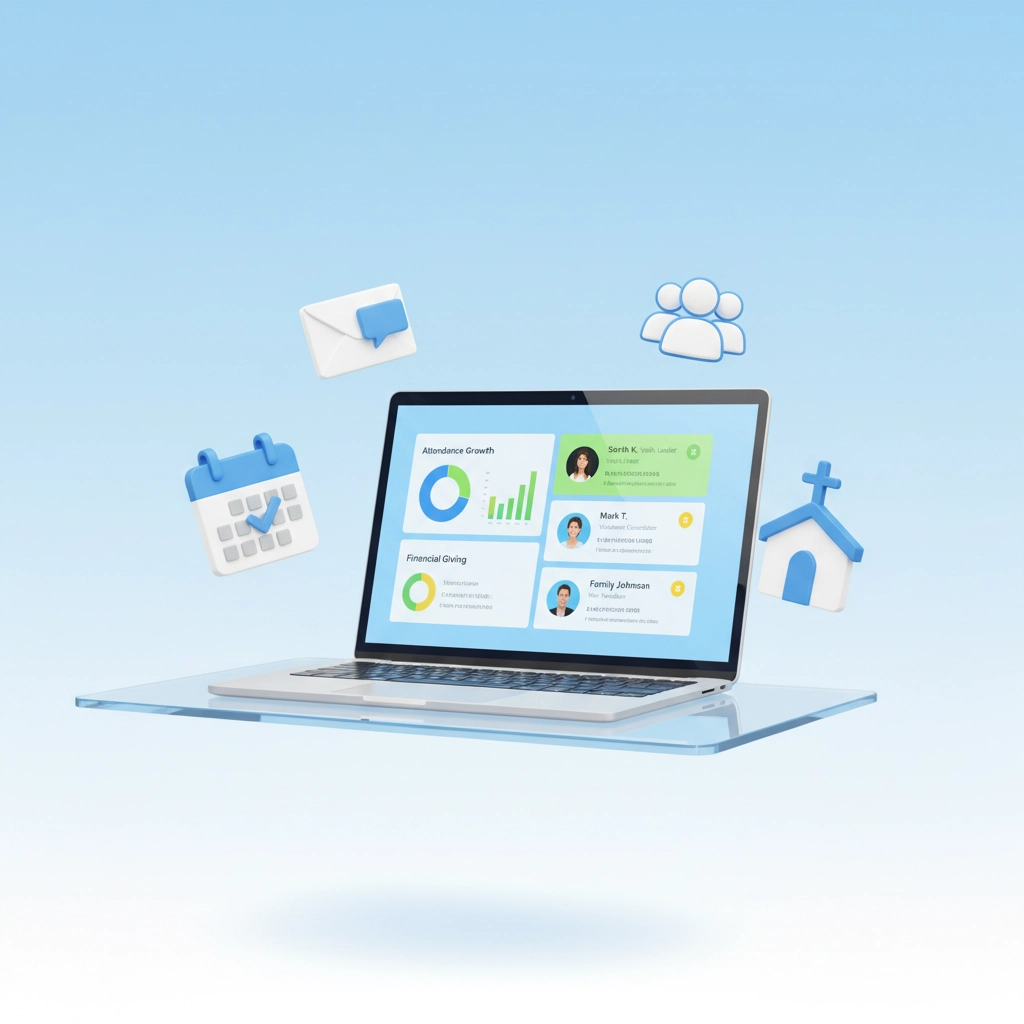If you're managing a church and wondering whether to stick with spreadsheets or upgrade to a church CRM, the answer depends on your congregation size and growth goals. For churches under 50 members with simple needs, spreadsheets work fine initially. However, growing churches with 50+ members benefit significantly from church CRM systems that offer automation, better collaboration, church-specific features, and seamless scalability.
Every church leader faces this decision at some point. You start small with a basic Excel file tracking member information, but as your ministry grows, those spreadsheets become unwieldy and time-consuming.
Let's break down the real differences between these two approaches so you can make the best choice for your ministry.
Why Many Churches Start with Spreadsheets
Spreadsheets feel like the natural choice for new or small churches. They're familiar, accessible, and budget-friendly.
Cost-Effectiveness
Most churches already have access to Excel or Google Sheets. There's no monthly subscription fee, no setup costs, and no additional software to purchase. For churches operating on tight budgets, this immediate cost savings feels significant.
Familiarity and Ease of Use
Your volunteers and staff likely know how to use spreadsheets already. There's minimal learning curve, and you can start organizing member data right away without extensive training sessions.
Basic Functionality That Works Initially
For fundamental tasks like storing contact information, tracking attendance, and maintaining simple donor lists, spreadsheets handle the job adequately. You can create filters to segment your congregation and use basic formulas for calculations.

The Hidden Problems with Spreadsheet Management
As your church grows, spreadsheet limitations become increasingly problematic.
Manual Data Entry Nightmare
Every piece of information requires manual input. New members, address changes, phone updates – someone has to type everything. This process is time-consuming and prone to human error. One accidental keystroke can delete crucial formulas or corrupt entire datasets.
Version Control Chaos
When multiple staff members need access to church data, spreadsheets create confusion. Which version is current? Who has the latest donor information? Staff members often end up working with outdated information, leading to embarrassing mistakes like sending duplicate thank-you letters or missing important member updates.
No Church-Specific Features
Spreadsheets weren't designed for church management. You'll struggle with fund accounting, donor tracking, and managing designated gifts. Complex workarounds become necessary, and these makeshift solutions often break when staff members who created them move on.
Limited Scalability
As your membership grows beyond a few hundred people, spreadsheets become sluggish and unreliable. Large files crash more frequently, searching for specific information takes longer, and the risk of data loss increases.
What's the biggest challenge you face with your current member management system right now?
How Church CRM Systems Transform Ministry Management
Church CRM platforms address these limitations with features specifically designed for religious organizations.
Automated Data Processing
Instead of manual entry for every piece of information, church CRMs offer integrations with other tools and automated data collection. Donation information flows directly into the system, attendance tracking happens automatically, and member updates sync across all platforms.
Centralized Collaboration
Multiple staff members can access real-time information simultaneously without version control issues. Everyone sees the same current data through clean dashboards designed for church operations.

Church-Specific Functionality
These systems understand church operations. They handle fund accounting automatically, track designated gifts properly, manage membership classes, and generate church-specific reports that help with decision-making and compliance.
Enhanced Communication Tools
Church CRMs make it simple to send newsletters, event announcements, and personalized messages to specific groups within your congregation. Automated follow-up sequences can nurture new visitors and keep members engaged.
Comprehensive Event Management
Planning church events becomes streamlined with built-in registration systems, attendance tracking, and volunteer coordination tools. Everything connects to your central member database.
Professional Financial Reporting
Generate donation statements, financial reports, and giving analytics without accounting expertise. The system handles complex calculations and produces professional documents that satisfy both church leadership and regulatory requirements.
Side-by-Side Feature Comparison
| Feature | Traditional Spreadsheets | Church CRM Systems |
|---|---|---|
| Initial Cost | Free or minimal | Monthly subscription fees |
| Setup Time | Minutes | Hours to days |
| Data Entry | Completely manual | Largely automated |
| Multi-User Access | Problematic version control | Real-time collaboration |
| Backup and Security | Manual, often forgotten | Automatic with professional security |
| Reporting Capabilities | Manual analysis required | Automated insights and dashboards |
| Member Communication | Copy/paste to external tools | Integrated communication system |
| Event Management | Separate tools needed | Built-in event planning |
| Financial Tracking | Basic calculations only | Comprehensive church accounting |
| Mobile Access | Limited functionality | Full mobile apps |
| Customer Support | DIY troubleshooting | Dedicated support teams |
| Scalability | Breaks down with growth | Designed for expansion |
Making the Right Choice for Your Church Size
Very Small Churches (Under 50 Members)
If your church has simple structure, straightforward finances, and only one person handling administration, spreadsheets can work initially. The cost savings matter more when resources are extremely limited. However, plan for eventual transition as you grow.
Small to Medium Churches (50-200 Members)
This is the sweet spot where church CRM systems provide the most value. Administrative complexity increases significantly in this range, and the time savings from automation quickly justify the monthly costs. Staff collaboration becomes essential, and church-specific features prevent common management mistakes.
Large Churches (200+ Members)
Church CRM systems become essential at this size. The volume of data, complexity of financial stewardship, and coordination requirements make spreadsheets completely inadequate. The investment in proper systems pays for itself through improved efficiency and reduced errors.
Churches Planning for Growth
If your church has growth goals or expects increased membership, start with a church CRM system early. The learning curve is easier when you're smaller, and you'll avoid the painful transition period that comes with switching systems during rapid growth.
Learn more about how Grow Ministry can support your church's specific needs by visiting our solutions page.
The Real Cost of Waiting
Many churches delay the transition to proper CRM systems because of perceived costs. However, the hidden costs of spreadsheet management often exceed CRM subscription fees.
Consider the staff time spent on manual data entry, the errors that require correction, and the missed opportunities from poor communication systems. When you factor in these hidden costs, church CRM systems often provide positive return on investment within the first year.
Which example here felt most useful to you and why?
Making the Transition Successfully
If you decide to move from spreadsheets to a church CRM, plan the transition carefully.
Start with Data Cleanup
Before importing spreadsheet data, clean up duplicates, standardize formats, and verify contact information accuracy. Most church CRM systems offer data import assistance to make this process smoother.
Train Your Team Gradually
Introduce new features progressively rather than overwhelming staff with everything at once. Focus on core functionality first, then expand to advanced features as comfort levels increase.
Maintain Parallel Systems Briefly
Run both systems simultaneously for a few weeks to ensure data accuracy and staff confidence before fully transitioning away from spreadsheets.
The transition might feel overwhelming initially, but the long-term benefits in administrative efficiency, member engagement, and ministry effectiveness make the effort worthwhile for most growing churches.
Your ministry deserves tools that support its mission rather than create additional administrative burdens. Whether you choose to start with spreadsheets or jump directly to a church CRM system, make sure your choice aligns with both your current needs and future growth plans.
Want more insights like this? Subscribe at www.growministry.com.
Questions or partnerships? Call our AI Receptionist at +1 (970) 426-0844.
Dan Kost, CEO — Grow Ministry
If this helped you, please comment, subscribe, and share.
Share:
#Motivation #Branding #Strategy #Marketing #AdvertisingAndMarketing #digitalmarketing #Innovation #Sports

